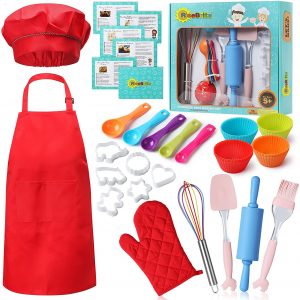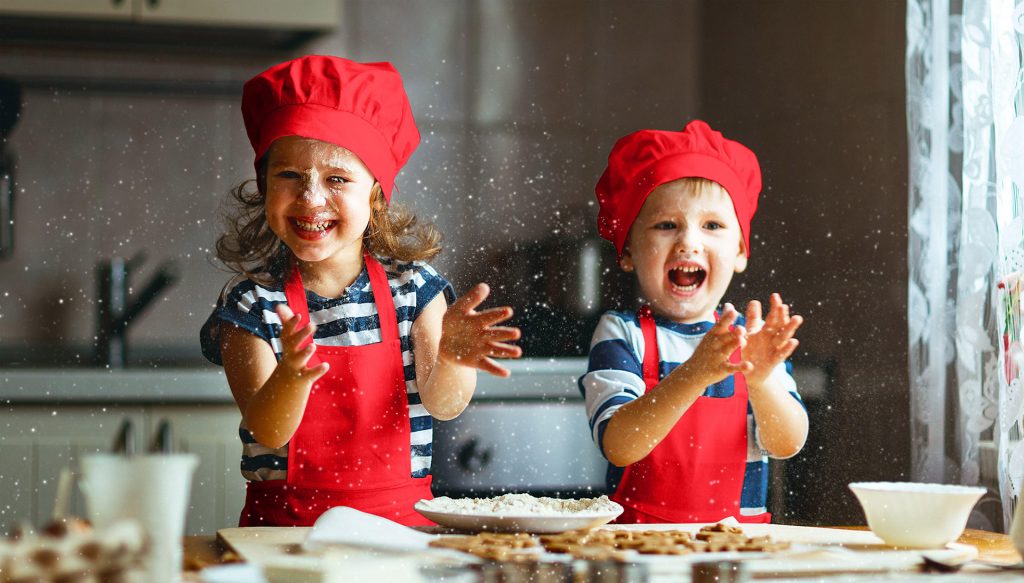Your child can learn a variety of skills from joining you for a baking session in the kitchen. Your budding baker will have the chance to practice skills from many of the major academic disciplines. These disciplines and skills include:
- Math
- Counting
- Units of measure
- Fractions
- Science
- Physical states
- Chemistry
- Temperature
- Time
- Microbiology
- Literacy
- Number recognition
- Reading and comprehension
- Life skills
- Self reliance
- Healthy eating
- Additional benefits
- Family bonding
Be careful not to overwhelm your little one, introduce one or two concepts each session, but feel free to vary it up between sessions.
Math Skills Your Child Will Learn When Baking
Baking has a surprising amount of math involved and can be a great activity to strengthen your child’s analytical mind.
Counting: For young children (2 to 5) baking is a great way to introduce the concept of quantity. Your little helper can help you count eggs, cups of milk, scoops of powder and stirs of batter.
Units Of Measure: Kids in the 6 to 8 range will start to be able to understand how things are measured. Baking offers great practice for concepts like cups, liters, gallons, ounces and pounds or milliliters, liters, grams and kilograms.
Fractions: Kids in the 6 to 8 range can also start to grasp the concept “parts of the whole.” Through baking they can be introduced to how the world is composed of smaller and smaller parts. In the United States, children will see the relationships between ¼, ½ and 1 cup, tablespoon or teaspoon. Children in countries using the metric system can learn how 500 milliliters is half a liter. Children 9 to 12 will also be able to start to grasp concepts like orders of magnitude, for example one liter equals one thousand milliliters. In all countries, children can learn seconds make up minutes, which make up hours.
Science Skills Your Child Will Learn When Baking
It’s difficult to address all the scientific concepts that a child can learn with baking. Baking is quite literally science! Here are some that can solidify what your child may be learning in preschool, kindergarten or grade school.
Physical States: One of the most intriguing phenomena your child will experience when baking will be when they witness materials changing from solid to liquid and liquid to gas. For example, the melting of butter or the bubbles created when mixing.
Chemistry: The sheer amount of chemistry in baking would be difficult to describe here as well, and again, care should be taken to introduce concepts with care not to overwhelm. Young children might start to grasp simple concepts like “mixtures,” the idea that multiple ingredients, when combined together, can create something completely new. Children with a bit of scientific foundation may explained the chemistry behind the leavening properties of baking soda, how mixing provides air to the mixture, and the egg coats the bubbles so they don’t collapse.
For seriously nerding out on this, watch this youtube clip:
Temperature: The force behind all the chemistry above is temperature. Older children can be taught the relationship between temperature and energy, and how energy can drive chemical reactions that create new molecules that manifest as new firmness and textures.
Time: Children of all ages can learn something about time. You children can learn that everything does not happen in the present, and that change happens only with the passing of time.
Microbiology: Baking soda is used in cakes, but if your baking bread, you will be using yeast. Both have the same function (producing air pockets,) and you can teach your child how there are living organisms that they cannot see that are “helping” them bake by producing bubbles and making the bread nice and fluffy. They can also be taught that microorganisms exists everywhere and some are not always “friendly.” Therefore it is important to always important to wash hands before handling food, as well as clean surfaces, and not eating raw batter.
Literacy Skills Your Child Will Learn From Baking
Number Recognition: Baking is a great way for young children to be introduced to the symbols that make up our number system. Your little one can help you identify how many scoops of flour to add from a recipe, or identify the marks on a measuring cup.
Reading and Comprehension: While younger children will probably be limited to short phrases, children six and up can start reading and planning baking recipes.
Life Skills Your Child Will Gain From Baking
Self Reliance: One of the biggest benefits of baking with your child is that you are teaching them skills that can be used in adulthood. Eating out every day can be expensive and unsustainable, so it’s extremely advantageous to possess kitchen skills. Someone who learned to bake as a child, will be unafraid to try new things in their future kitchen, and as a result be less dependent on others.
Healthy Eating: While what usually pops into someone’s head when they think “baking” is “sweets,” baking can also involve savory items as well. Often these can be vegetables and lean meats. Also, “sweets” can be baked using healthy alternatives, like using carob instead of chocolate, or less refined sugars. The opportunities to produce healthier confections is literally limitless.
Additional Benefits Of Baking With Your Child
Family Bonding: Your child will benefit immensely from the time you spend with them in the kitchen baking. Baking together quite literally conveys love for one another, creating deep bonds and emotional connection. Make sure to praise your child while baking, giving them a sense of confidence and value within the family unit.
What Supplies Will You Need To Bake With Your Child
The answer to this question will of course depend on what you plan to bake with your child, and how old they are. Typically one will need a whisk and spatula for cakes or cupcakes, and a rolling pin, butter brush and cookie cutters for cookie recipes. If you really want to improve the experience, an apron and chef hat of their own will make things a lot more fun for them. For smaller kids, it can be difficult to find baking tools for kids that fit in their hands.
With this in mind, we created our Ultimate Kids Baking Set which we really believe both you and your child with love.
-
 Kids Baking Set 35 Pieces$39.99
Kids Baking Set 35 Pieces$39.99


Pingback: A Buyer's Guide For Children's Cooking and Baking Books - RiseBrite